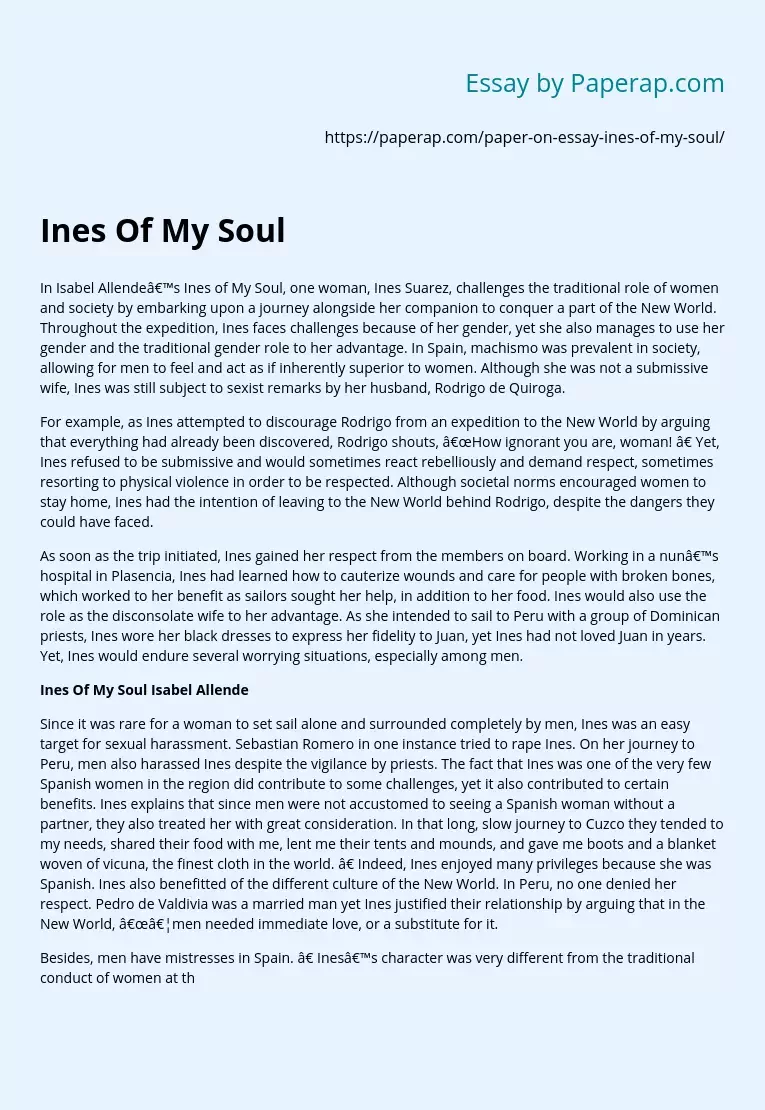Ines Of My Soul
In Isabel Allende’s Ines of My Soul, one woman, Ines Suarez, challenges the traditional role of women and society by embarking upon a journey alongside her companion to conquer a part of the New World. Throughout the expedition, Ines faces challenges because of her gender, yet she also manages to use her gender and the traditional gender role to her advantage. In Spain, machismo was prevalent in society, allowing for men to feel and act as if inherently superior to women.
Although she was not a submissive wife, Ines was still subject to sexist remarks by her husband, Rodrigo de Quiroga.
For example, as Ines attempted to discourage Rodrigo from an expedition to the New World by arguing that everything had already been discovered, Rodrigo shouts, “How ignorant you are, woman! ” Yet, Ines refused to be submissive and would sometimes react rebelliously and demand respect, sometimes resorting to physical violence in order to be respected. Although societal norms encouraged women to stay home, Ines had the intention of leaving to the New World behind Rodrigo, despite the dangers they could have faced.
As soon as the trip initiated, Ines gained her respect from the members on board. Working in a nun’s hospital in Plasencia, Ines had learned how to cauterize wounds and care for people with broken bones, which worked to her benefit as sailors sought her help, in addition to her food. Ines would also use the role as the disconsolate wife to her advantage. As she intended to sail to Peru with a group of Dominican priests, Ines wore her black dresses to express her fidelity to Juan, yet Ines had not loved Juan in years.
Yet, Ines would endure several worrying situations, especially among men.
Ines Of My Soul Isabel Allende
Since it was rare for a woman to set sail alone and surrounded completely by men, Ines was an easy target for sexual harassment. Sebastian Romero in one instance tried to rape Ines. On her journey to Peru, men also harassed Ines despite the vigilance by priests. The fact that Ines was one of the very few Spanish women in the region did contribute to some challenges, yet it also contributed to certain benefits. Ines explains that since men were not accustomed to seeing a Spanish woman without a partner, they also treated her with great consideration. In that long, slow journey to Cuzco they tended to my needs, shared their food with me, lent me their tents and mounds, and gave me boots and a blanket woven of vicuna, the finest cloth in the world. ” Indeed, Ines enjoyed many privileges because she was Spanish. Ines also benefitted of the different culture of the New World. In Peru, no one denied her respect. Pedro de Valdivia was a married man yet Ines justified their relationship by arguing that in the New World, “…men needed immediate love, or a substitute for it.
Besides, men have mistresses in Spain. ” Ines’s character was very different from the traditional conduct of women at that time. In fact, Pedro admits that Ines was intimidating. She was also very assertive. Yet, because of women’s inferior status in society, Ines would not be taken seriously as she tried to convince Pizarro to allow her to accompany Pedro de Valdivia on his quest to Chile. However, Ines would use one of her skills to her advantage, that of dowsing, or locating water as an argument for why she should be allowed to go.
When in Chile, Ines does indeed find water and all the conquistadores manage to drink, for which they, especially Pedro de Valdivia, were very thankful with Ines. “She saved us from thirst and in the desert…she, more than anyone, deserves to participate in this meeting. ” Yet, Ines did express concern at times with her role as a woman among men. As the captains debated whether to execute Sancho de la Hoz, Ines remained silent and did not tell Pedro what he should do, since she did not want to be seen as a virago who told de Valdivia everything that he should do.
During the battles against the indigenous, Ines and the other women were expected to cook for the soldiers and take care of them. Indeed, the women played a key role in the sustenance of the soldiers. Ines, Catalina, Cecilia, and other women would go to surrounding areas and trade with the indigenous tribes. They also considered themselves ‘healers’ and ‘physicians. ’ As Ines states, “We had good hands for setting broken bones, cauterizing wounds, and helping as midwives; those talents served us well. Certainly, Ines and the other women played an important role in the colonization of such countries, including Chile. In Spain, women lived in a highly patriarchal society. Yet, even though such traits were present in the New World, women were allowed to express themselves more freely there. In the New World, women had a higher chance of social mobility and increasing their social status. With them, they brought their nurturing skills as caretakers of the soldiers, which contributed to their survival significantly.
However, one also has to consider the hardships that women had to endure. Ines Suarez faced many of these challenges, yet her character allowed her to overcome them. She also possessed unique talents that allowed her to earn a higher level of respect from the men. However, not all women who came with the conquistadors shared such qualities. ?
Bibliography Allende, Isabel. Ines of My Soul. New York: HarperCollins Publishers, 2006. Burkholder, Mark A. , and Lyman L. Johnson. Colonial Latin America. 7 ed. New York: Oxford University Press, 2010.
Ines Of My Soul. (2019, Dec 05). Retrieved from https://paperap.com/paper-on-essay-ines-of-my-soul/

